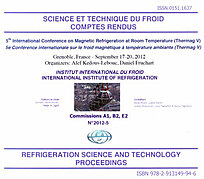
Summary
Numerical simulation method has been used to investigate a rotary active magnetic regenerator (RAMR) around room temperature range. In order to study the impact of factors such as operation frequency, different flow rate, various kinds of heat transfer fluid and magnetic field intensity on the performance of the RAMR, a two-dimensional porous model based on energy conservation equations of the fluid around gadolinium particles has been established. The internal temperature distribution and cooling capacity of the system were obtained and the influence of operation frequency on the cooling capacity is discussed. The simulation results showed that when mercury substituted water as heat transfer fluid, the cooling capacity can be improved by nearly 600%. The fluid with high conductivity, high density and low specific heat properties is more suitable to be heat transfer fluid. It is demonstrated that the environment conditions such as heat/cool source temperature affected the performance of the RAMR directly. Three feasible types of test standards have been proposed according to evaluation index of a fixed test environment, index of maximum exergy and index of maximum specific exergy around Curie temperature, respectively.
Available documents
Format PDF
Pages: 461-468
Available
Public price
20 €
Member price*
Free
* Best rate depending on membership category (see the detailed benefits of individual and corporate memberships).
Details
- Original title: Fluid choice and test standardization for magnetic regenerator used in room temperature.
- Record ID : 30005595
- Languages: English
- Source: 5th International Conference on Magnetic Refrigeration at Room Temperature (Thermag V). Proceedings: Grenoble, France, September 17-20, 2012.
- Publication date: 2012/09/17
Links
See other articles from the proceedings (70)
See the conference proceedings
-
New thermodynamic cycles for magnetic refrigera...
- Author(s) : KITANOVSKI A., TUSEK J., POREDOS A.
- Date : 2012/09/17
- Languages : English
- Source: 5th International Conference on Magnetic Refrigeration at Room Temperature (Thermag V). Proceedings: Grenoble, France, September 17-20, 2012.
- Formats : PDF
View record
-
A versatile magnetic refrigeration demonstrator.
- Author(s) : VELÁZQUEZ D., PALACIOS E., ESTEPA C., et al.
- Date : 2014/09/07
- Languages : English
- Source: 6th International Conference on Magnetic Refrigeration at Room Temperature (Thermag VI). Proceedings: Victoria, Canada, September 7-10, 2014.
- Formats : PDF
View record
-
Effect of magnetic field configuration of perma...
- Author(s) : KIM Y., JEONG S.
- Date : 2010/08/23
- Languages : English
- Source: 4th International Conference on Magnetic Refrigeration at Room Temperature (Thermag IV). Proceedings: Baotou, China, August 23-27, 2010.
- Formats : PDF
View record
-
Modeling and experimental validation of a flat-...
- Author(s) : VUARNOZ D., KAWANAMI T.
- Date : 2012/09/17
- Languages : English
- Source: 5th International Conference on Magnetic Refrigeration at Room Temperature (Thermag V). Proceedings: Grenoble, France, September 17-20, 2012.
- Formats : PDF
View record
-
Thermal imaging of active magnetic regenerator ...
- Author(s) : SHASSERE B., ABDELAZIZ O., EVANS B., et al.
- Date : 2012/09/17
- Languages : English
- Source: 5th International Conference on Magnetic Refrigeration at Room Temperature (Thermag V). Proceedings: Grenoble, France, September 17-20, 2012.
- Formats : PDF
View record
